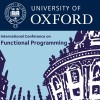On the Expressive Power of User-Defined Effects: Effect Handlers, Monadic Reflection, Delimited Control
Co-written by Yannick Forster (Saarland University, Germany and University of Cambridge, UK), Sam Lindley (University of Edinburgh).
We compare the expressive power of three programming abstractions for user-defined computational effects: Bauer and Pretnar's effect handlers, Filinski's monadic reflection, and delimited control without answer-type-modification. This comparison allows a precise discussion about the relative expressiveness of each programming abstraction. It also demonstrates the sensitivity of the relative expressiveness of user-defined effects to seemingly orthogonal language features.
We present three calculi, one per abstraction, extending Levy's call-by-push-value. For each calculus, we present syntax, operational semantics, a natural type-and-effect system, and, for effect handlers and monadic reflection, a set-theoretic denotational semantics. We establish their basic meta-theoretic properties: safety, termination, and, where applicable, soundness and adequacy. Using Felleisen's notion of a macro translation, we show that these abstractions can macro-express each other, and show which translations preserve typeability. We use the adequate finitary set-theoretic denotational semantics for the monadic calculus to show that effect handlers cannot be macro-expressed while preserving typeability either by monadic reflection or by delimited control. We supplement our development with a mechanised Abella formalisation.




